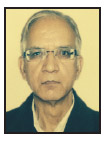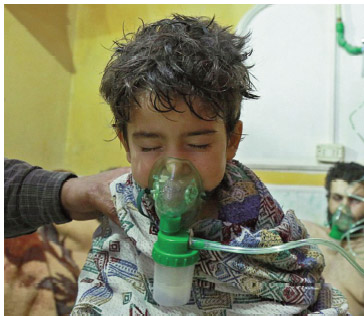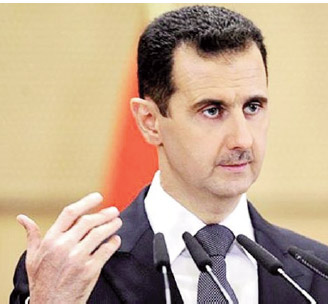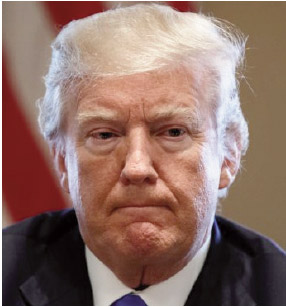Need for an effective strategy
 Syed Nooruzzaman
Syed Nooruzzaman
 The Syrian civil war that
began seven years ago is
likely to acquire new
dimensions as indicated
by the posturing
indulged in by the US
and Russia in the wake of the Bashar
Al-Assad regime using banned
chemical weapons to recapture the
rebel-held Douma area on April 7. The
condemned Syrian action led to US,
British and French forces making
retaliatory strikes on the West Asian
nation's military facilities to send
across a strong message: Recourse to
chemical weapons on any pretext
would invite bigger and quick punitive
action.
The Syrian civil war that
began seven years ago is
likely to acquire new
dimensions as indicated
by the posturing
indulged in by the US
and Russia in the wake of the Bashar
Al-Assad regime using banned
chemical weapons to recapture the
rebel-held Douma area on April 7. The
condemned Syrian action led to US,
British and French forces making
retaliatory strikes on the West Asian
nation's military facilities to send
across a strong message: Recourse to
chemical weapons on any pretext
would invite bigger and quick punitive
action.
In April 2017 too US forces
launched Tomahawk missile strikes
on a Syrian Air Force base when
Damascus was accused of a 'sarin' gas
attack on the rebel-held town of Khan
Sheikhoun in Idlib province.
 The latest pounding of governmentcontrolled
areas by the US and its
European allies came with President
Donald Trump warning the Syrian
government and its supporters like
Russia and Iran that their inhuman
acts against civilians would not go
unchallenged. However, the Russian
response to this was, "It is necessary to
once again caution that military
intervention under false and
fabricated pretexts in Syria, where
Russian servicemen stay at the request
of the legitimate government, is
absolutely unacceptable and may
trigger the gravest consequences."
The latest pounding of governmentcontrolled
areas by the US and its
European allies came with President
Donald Trump warning the Syrian
government and its supporters like
Russia and Iran that their inhuman
acts against civilians would not go
unchallenged. However, the Russian
response to this was, "It is necessary to
once again caution that military
intervention under false and
fabricated pretexts in Syria, where
Russian servicemen stay at the request
of the legitimate government, is
absolutely unacceptable and may
trigger the gravest consequences."
The posturing by the backers of the
repressive Bashar al-Assad
government and its opponents fighting
for a regime change shows that the
emerging scenario may take a turn for
the worse if an urgent and meaningful
drive is not initiated for establishing
peace in Syria. In view of this
apprehension, a renewed United
Nations-led diplomatic move has been launched for fresh intra-Syrian talks.
The UN Special Envoy for Syria, Staffan
de Mistura, is doing all he can for kickstarting
a UN-facilitated political
process in accordance with Security
Council resolution number 2254
(passed in 2015) to bring about peace
through democratic elections in the
war-torn nation. In this connection he
has met foreign ministers of many
countries, including members of the
Arab League, Russia, Iran and Turkey.
The outcome of his efforts may change
the course of events in Syria, which has
most of its cities flattened with nearly
five lakh people killed, over 10 lakh
injured and as many as12 million
having got displaced in the seven-yearlong
civil war.
Earlier, such efforts led to the
signing of the Geneva Communique in
2012 which called for setting up of a
governing body in Syria "on the basis
of mutual consent" but in vain. Nine
rounds of UN-mediated peace
negotiations -- the Geneva II process --
launched in 2014 also failed to
produce the desired results because of
the Syrian dictator refusing to agree to
step aside. Despite so much death and
destruction during his rule, he is just
not prepared to see the writing on the
wall owing to his unending lust for
absolute power.
Russia, which has been openly
providing all kinds of assistance to the
Assad regime since 2015 on various
pretexts, came out with the idea of
hosting a Congress of National
Dialogue, also called the Astana
process, in January this year. However,
this dialogue process died in infancy as
it had inbuilt infirmities owing to its
being primarily aimed at saving the
Syrian dictator's interests which
compelled most opposition
representatives to boycott the Russian
initiative.
 Bashar al-Assad
It appears that at this stage the
Assad regime is in a stronger position as it has recaptured most of the areas
earlier under the rebel control after
much bloodshed with the help of its
staunch allies --- Russia and Iran --- yet
it cannot silence the change-seekers
forever. Opposition armed groups like
the Free Syrian Army and the Syrian
Democratic Forces (SDF), an alliance of
Arab and Kurdish militias, may
continue to get financial and other
kinds of support from regional
governments and non-Arab sources
because of the growing rivalry for
influence in West Asia between Russia
and Iran with clandestine Chinese
backing being on the one side and the
US, Turkey, Saudi Arabia and their
allies on the other.
Bashar al-Assad
It appears that at this stage the
Assad regime is in a stronger position as it has recaptured most of the areas
earlier under the rebel control after
much bloodshed with the help of its
staunch allies --- Russia and Iran --- yet
it cannot silence the change-seekers
forever. Opposition armed groups like
the Free Syrian Army and the Syrian
Democratic Forces (SDF), an alliance of
Arab and Kurdish militias, may
continue to get financial and other
kinds of support from regional
governments and non-Arab sources
because of the growing rivalry for
influence in West Asia between Russia
and Iran with clandestine Chinese
backing being on the one side and the
US, Turkey, Saudi Arabia and their
allies on the other.
Syria can never have peace so long
as President Bashar al-Assad remains
in the saddle as a vast majority of the
country's population has no faith in his
regime's ability to take care of their
interests owing to the strong Sunni-
Shia factor guiding its thinking. As is
well known, the Syrian dictator
happens to be an Alawi (a Shia)
whereas the overwhelming majority of
the country's population is Sunni. The
population complexion is unlikely to
change to suit his dirty designs despite
lakhs of people having been killed and
an equally large number of them
having migrated to neighbouring
Jordan and Lebanon as well as to
European countries like Turkey.
According to a UN estimate,
over 13.1 million people
living in Syria will be in
need of humanitarian
assistance in 2018 . They
cannot be loyal to the
present government as
they have suffered untold
miseries because of its
highhandedness in dealing
with those who initially
raised their voice seeking
better employment
opportunities, elimination
of rampant corruption and
restoration of their human
rights.
 Donald Trump
According to a UN estimate, over
13.1 million people living in Syria will
be in need of humanitarian assistance
in 2018 . They cannot be loyal to the
present government as they have
suffered untold miseries because of its
highhandedness in dealing with those
who initially raised their voice seeking
better employment opportunities,
elimination of rampant corruption and
restoration of their human rights.
Donald Trump
According to a UN estimate, over
13.1 million people living in Syria will
be in need of humanitarian assistance
in 2018 . They cannot be loyal to the
present government as they have
suffered untold miseries because of its
highhandedness in dealing with those
who initially raised their voice seeking
better employment opportunities,
elimination of rampant corruption and
restoration of their human rights.
These disgruntled people, who held
large-scale demonstrations against the
dictatorial regime, demanding its
replacement by a democratically
elected government in 2011, were
hopeful of getting their objectives
achieved in the wake of what had
come to be known as the Arab Spring,
which swept many countries in the region and toppled the then dictators
in Tunisia, Egypt, Yemen and Libya. The
people's hopes, however, got
shattered because of various reasons.
The anti-Assad regime protests that
began on March 15, 2011, were met
with the Syrian security forces killing
hundreds of demonstrators and
throwing a large number of others into
jails. The strong-arm tactics of the
authoritarian regime, ignoring the just
aspirations of the people, caused
defections in the Syrian Army, leading
to the formation of the Free Syrian
Army aimed at overthrowing the
government in Damascus. This is how
the Syrian civil war broke out, putting
the future of the Alawite dictatorship
in jeopardy.
The repressive tactics used to
contain the anti-government protests
ultimately acquired a sectarian hue as
the Syrian security forces, dominated
by Shias, though in minority, began to
target mainly Sunnis.
The Sunni-Shia divide got further
sharpened with the emergence of the
Sunni extremist movement called the
Islamic State of Syria and the Levant,
also known as the Islamic State of Iraq
and Syria (ISIS), now a part of history.
Heinous activities of the ISIS and the
Assad regime attracted global
attention with the US along with its
Western allies, Russia, China, Turkey,
Saudi Arabia and Iran deciding to play
their role to protect their own political,
commercial and other interests.
As it appears, the people's
outbursts in Syria, initially against their
repressive government, have led to the
eruption of a three-cornered war for
the domination of the Muslim world
with Iran with the help of Russia
fighting for safeguarding Shia
interests, and Saudi Arabia and Turkey
competing for the leadership of the
Sunni Muslim world. However, all this
is not in the larger interest of Syria as
well as the rest of West Asia. An
effective strategy needs to be devised
to resolve the sectarian issues
worsening the crisis in Syria.
The writer is a New Delhibased
senior journalist.




 Syed Nooruzzaman
Syed Nooruzzaman

 Bashar al-Assad
Bashar al-Assad Donald Trump
Donald Trump